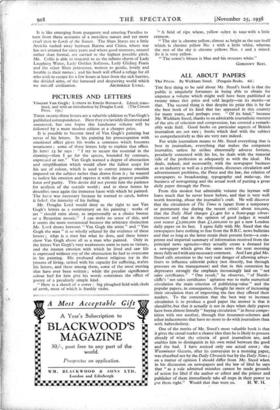ALL ABOUT PAPERS
The Press. By Wickham Steed. (Penguin Books. 6d.)
THE first thing to be said about Mr. Steed's book is that the public is singularly fortunate in being able to obtain for sixpence a volume which might well have been published at twenty times this price and sold largely—on its merits—at that. The second thing is that despite its price this is by far the best book of its kind that has appeared in this country for many years, and perhaps ever. " Of its kind," because Mr. Wickham Steed, thanks to an admirable journalistic mastery of the arts of selection and compression, has covered a remark- ably wide field. Good books on particular aspects of British journalism are not rare ; books which deal with the subject so comprehensively as this are very rare indeed.
For while journalism means to Mr. Steed everything that is best in journalism, everything that makes the competent journalist, unless he strikes abnormally adverse fortune, peculiarly contented with his lot, he deals with the material side of the profession as adequately as with the ideal. He deals, indeed, and necessarily, with the newspaper business as an industry as well as a profession, discusses circulation and advertisement problems, the Press and the law, the relation of newspapers to broadcasting, typography and make-up, the business of newsgetting and the actual work of putting a great daily paper through the Press.
From this modest but admirable volume the layman will learn much that he never knew before, and that is very well worth knowing, about the journalist's craft. He will discover that the circulation of The Times is (apart from a temporary or permanent rise during the recent crisis) about 200,000, that the Daily Mail charges £1,400 for a front-page adver- tisement and that in the opinion of good judges it would cost nearer L2,000,000 than kr,000,000 to get a new London daily paper on its feet. 1. agree fully with Mr. Steed that the newspapers have nothing to fear from the B.B.C. news bulletins and that so long as the latter retain their present form—a com- petent and impartial summary of information received from the principal news agencies—they actually create a demand for a newspaper which gives the same news the next morning more fully and with anynecessary comment. And I am glad .Mr. Steed calls attention to the very real danger of allowing adver- tisers to influence editorial policy (not directly, but through pressure on the management) and that in this connexion he deprecates strongly the emphasis increasingly laid on " net sales certificates." " One result," he observes, " of North- cliffe's ' net sales certificates ' agitation was to make numerical circulation the main criterion of publishing-value " and the popular papers, in consequence, thought far more of increasing their circulation than of improving the fare they offered their readers. To the contention that the best way to increase circulation is to produce a good paper the answer is that it should be, but that it actually is not in days when daily papers have been almost literally " buying circulation " in fierce compe. tition with one another, through free insurance-schemes and other inducements that have no more to do with journalism than with haberdashery.
One of the merits of Mr. Steed's most valuable book is that it gives the casual reader a clearer idea than he is likely to possess already of what the criteria of good journalism are, and enables him to distinguish in his own mind between the good and the bad. I have noticed only one actual error ; the Westminster Gazette, after its conversion to a morning paper, was absorbed not by the Daily Chronicle but by the Daily News ; on a matter of opinion I should differ from Mr. Steed when in his discussion on newspapers and the law of libel he says that " as a rule admitted mistakes cannot be made, grounds of action for libel if the author or editor and the printer and publisher of them immediately take all steps in their power to put them right." Would that that were so. H. W. H.














































 Previous page
Previous page